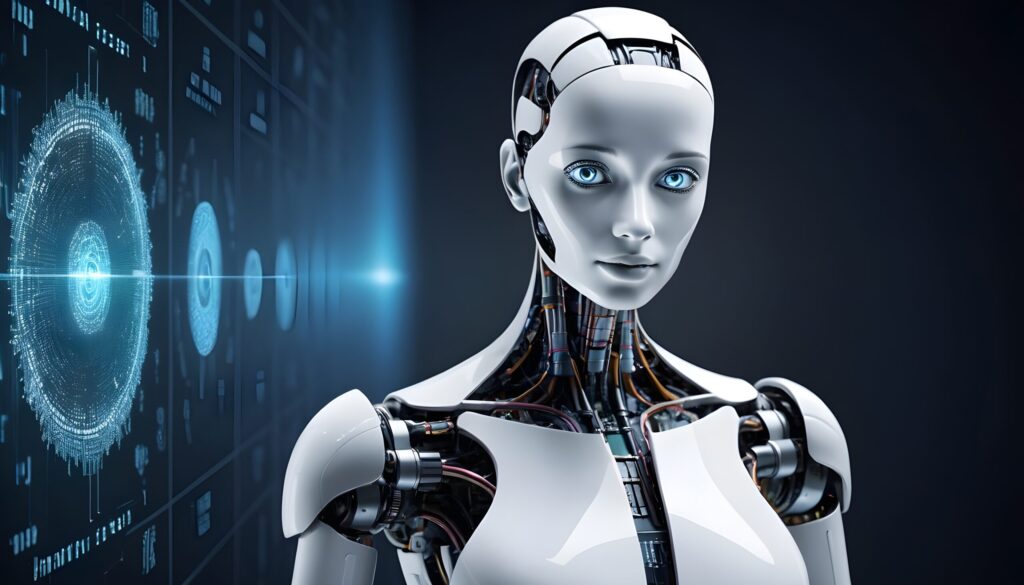Introduction
Imagine waking up in 2030, your coffee is already brewing thanks to your smart home, and your daily schedule is optimized by an artificial intelligence (AI) assistant that knows your preferences better than you do yourself. Sounds like a scene from a sci-fi movie, right? But hold onto your hats, because this future is not as far off as it seems. AI is on a spectacular journey, transforming our world and the way we handle our daily tasks. From revolutionizing mundane chores to redefining professional interactions, AI’s impact is becoming more profound and deeply integrated into our lives. In this article, we’ll dive into how AI is set to change the game by 2030, making our everyday activities more efficient and convenient. Whether it’s automating household tasks or enhancing our work efficiency, AI is gearing up to make our lives easier in ways we’ve only begun to imagine.
The Current Landscape of Artificial Intelligence
Definition of Artificial Intelligence
Artificial intelligence, or AI, might sound like something straight out of a sci-fi movie, but it’s already a big part of our world today. Simply put, AI is a branch of computer science that aims to create machines that can think, learn, and act like humans. What makes AI truly fascinating is its ability to process huge amounts of data quickly and make decisions based on that data, mimicking human intelligence. From chatbots that can answer your questions in real-time to predictive analytics that forecast the weather with astonishing accuracy, AI is all around us.
Current Applications of AI in Everyday Life
You might not realize it, but AI has quietly woven itself into the fabric of our daily lives. Ever asked Siri for directions or used Google Photos to categorize your pictures? That’s AI at work. Here are a few ways AI is currently used in everyday tasks:
– Voice Assistants: Devices like Amazon’s Alexa and Apple’s Siri use AI to understand and respond to your voice commands.
– Online Shopping Recommendations: Ever wondered how Amazon knows just what you’re looking for? AI algorithms analyze your browsing and purchase history to recommend products.
– Autonomous Vehicles: While fully self-driving cars aren’t mainstream yet, many modern cars use AI for assistance features, like parking and collision avoidance.
– Smart Homes: Thermostats that adjust themselves and fridges that can order groceries are no longer things of the future.
Predictions for AI’s Impact on Daily Tasks by 2030
Increased Automation in Household Chores
By 2030, AI is expected to take home automation to the next level. Imagine robots that don’t just vacuum your floors but also mop them, clean windows, and even do the laundry. Smart kitchens could plan meals, order the necessary ingredients, and prepare them just in time for dinner. This leap in AI capabilities promises to free up our time from mundane chores, giving us more freedom to pursue our passions.
Enhanced Efficiency in Workplace Tasks
The workplace of 2030 will likely see AI streamlining tasks to boost efficiency. AI could handle scheduling, email management, and even some aspects of customer service, freeing employees to focus on more creative and complex tasks. Furthermore, AI-driven data analysis could uncover insights faster than any human team, leading to more informed business decisions and strategies.
Personalized Shopping Experiences through AI
Shopping is set for a transformation too. AI will enable even more personalized experiences by understanding your preferences and budget in a deeper way. It could suggest outfits based on your fashion taste, nutritional plans based on your health goals, or even vacations tailored to your interests. This level of customization could redefine the way we think about customer service and satisfaction.
In conclusion, the trajectory of AI development suggests that by 2030, our daily tasks could be significantly more automated, efficient, and personalized. This promising future will likely make our lives more convenient, but it also emphasizes the need to adapt to a rapidly changing technological landscape.
Challenges and Ethical Considerations of AI Integration
With the fast-paced adoption of AI, numerous challenges and ethical considerations come to the forefront. These issues demand immediate attention and solutions to ensure that the integration of artificial intelligence into daily tasks is smooth and beneficial for all.
Data Privacy Concerns
One of the paramount issues is data privacy. As AI systems require vast amounts of data to learn and make decisions, the question of how this data is collected, stored, and used becomes critical. There’s a fine line between leveraging data for efficiency and invading someone’s privacy. Ensuring that AI systems are transparent in their data handling and adhere to strict privacy regulations is key to maintaining public trust.
Job Displacement and Reskilling Needs
The advent of AI is bound to revolutionize the job market. While it opens up new avenues and industries, it also poses the risk of displacing workers in traditional roles. This brings up the necessity for substantial reskilling and upskilling programs. Governments, educational institutions, and corporations need to work together to prepare the workforce for the future, where digital skills and AI literacy will be invaluable.
Bias in AI Algorithms
Another significant concern is the bias inherent in AI algorithms. Since AI systems learn from existing data, any pre-existing biases present in that data can be perpetuated and even amplified. This can lead to unfair treatment and discrimination in various fields such as hiring, law enforcement, and loan approvals. Developing AI with fairness in mind, testing it across diverse datasets, and constantly auditing for bias is essential to mitigate this issue.
Industries Poised for Maximum AI Transformation by 2030
Several industries stand at the brink of a major transformation due to AI, promising not only to streamline operations but also to offer ground-breaking services and solutions.
Healthcare
In healthcare, AI promises to revolutionize diagnostics, treatment planning, and patient care. From early detection of diseases using AI-powered imaging tools to personalized medicine based on genetic information, the potential is vast. Moreover, AI can streamline administrative processes, allowing healthcare professionals to focus more on patient care. Telemedicine, powered by AI, is also breaking down geographical barriers, making healthcare more accessible.
Transportation
The transportation industry is set to undergo a significant shift with the integration of AI. Autonomous vehicles, capable of reducing accidents and optimizing traffic flow, could become the norm. AI can also enhance logistic and supply chain operations, making them more efficient and reducing carbon footprints. Moreover, public transportation systems could see improvements in scheduling and maintenance, making travel more reliable.
Education
Education is another sector where AI can have a profound impact. Customized learning experiences, where the curriculum adapts to the individual learning pace and style of each student, could become possible through AI. Virtual tutors and AI-powered applications can provide additional support, ensuring that students understand concepts thoroughly. Furthermore, administrative tasks like grading and attendance can be automated, allowing educators to spend more time engaging with students and less on paperwork.
By addressing the challenges and embracing the opportunities, AI integration into daily tasks by 2030 has the potential to enhance efficiency, convenience, and quality of life across various sectors.
Innovations Driving the Future of AI
The world as we know it is on the brink of a revolution, spearheaded by Artificial Intelligence (AI). This transformative journey is fueled by key innovations designed to upend traditional methods, making every day smarter, safer, and more efficient by 2030.
Machine Learning Advancements
At the core of this evolution lies Machine Learning (ML), a subset of AI that focuses on the development of systems that learn and improve from experience. This entails creating algorithms that not only process vast amounts of data more efficiently than ever but also adapt to new information independently. The result? Personalized shopping experiences, smarter personal assistants, and even more accurate weather predictions, all tailored to your needs without manual intervention.
Robotics Integration
Robotics integration into daily life is another significant milestone. Imagine a world where robots not only manufacture goods but also perform surgery with precision beyond human capabilities, deliver groceries directly to your doorstep, and even assist in household chores. This isn’t the stuff of science fiction anymore but a reality that’s being shaped today, promising a future where humans and robots coexist to make life easier in countless ways.
Natural Language Processing Developments
Natural Language Processing (NLP) is ushering in a new era where machines understand, interpret, and generate human language in a way that is both meaningful and useful. This technology powers virtual assistants, translates languages instantaneously, and makes customer service interactions seamless. By 2030, NLP is expected to break down language barriers entirely, creating a world where effective communication with technology is as natural as talking to a friend.
Societal Benefits of AI Revolutionizing Daily Tasks
The integration of AI into daily life is not just about convenience; it has profound societal benefits that could reshape the way we live, work, and interact with our environment.
Improved Safety through AI-Powered Devices
AI-powered devices are set to significantly enhance our safety. From autonomous vehicles that reduce the risk of accidents on the road to surveillance systems that can predict and prevent criminal activities, AI is a game-changer. Even in healthcare, AI-driven diagnostics and treatments offer the potential for earlier detections and more personalized care, potentially saving millions of lives.
Time-Saving Features in Smart Cities
Smart cities, powered by AI, promise to make mundane tasks a breeze. Traffic management systems will optimize flow, drastically reducing commute times, while smart grids will manage electricity use more efficiently, ensuring no time is wasted on power outages. Imagine public services that predict and meet your needs before you even articulate them, from waste collection to park maintenance, all streamlined to save you time.
Sustainable Practices in Agriculture and Energy
Lastly, AI’s role in promoting sustainability cannot be overstated. In agriculture, AI-powered drones and sensors can monitor crop health and soil conditions, optimizing water and fertilizer use to significantly increase yields while reducing waste. In the energy sector, AI algorithms forecast demand and adjust supply accordingly, leading to a smarter, greener grid. These innovations not only save time but also pave the way for a more sustainable future for the planet.
As we inch closer to 2030, the possibilities that AI brings to the table are boundless. These innovations promise to transform our daily tasks, improving efficiency and convenience while fostering a safer, more sustainable world.
Conclusion: Embracing the AI Revolution for a Smarter Future
As we stand on the brink of a new era, the transformation brought about by artificial intelligence in our daily tasks cannot be overstated. By 2030, AI promises to redefine convenience, efficiency, and productivity, making our lives easier in ways we can only begin to imagine. From automating mundane chores to providing personalized experiences and enhancing decision-making, AI is set to revolutionize our daily lives, making smart living not just a concept but a reality.
Embracing AI technology means welcoming a future where tasks are not only performed faster but also with greater accuracy and creativity. The integration of AI into everyday life heralds a period of unprecedented innovation that will touch every aspect of our existence. As we move towards this smarter future, it’s essential to stay informed and adaptable to the changes AI will bring. The journey ahead is filled with possibilities, and by supporting and understanding AI advancements, we can ensure a future that enhances quality of life for all.
In summary, the AI revolution is not just about the introduction of new technologies; it’s about reshaping the very fabric of our daily routines for the better. By 2030, the way we live, work, and interact will have transformed, with AI at the heart of this change. So, let’s look forward with optimism and readiness, as we embrace the AI revolution for a smarter, more efficient, and incredibly exciting future.


